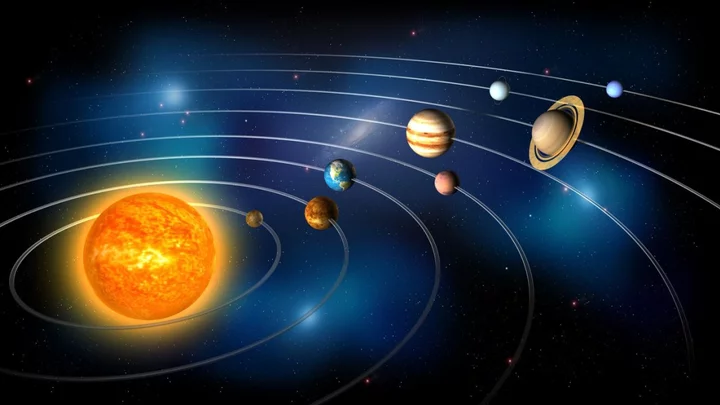
Braves vs. Guardians prediction and odds for Tuesday, July 4 (Atlanta or nothing)
The Atlanta Braves are the hottest team in baseball, and have the best record in the National League despite dealing with injuries at the top of their rotation.Atlanta took the opening game of its series with the Cleveland Guardians on Monday, the team’s ninth straight victory.The Brav...
2023-07-05 00:20

Christian Pulisic could be on his way to AC Milan
Christian Pulisic could be on his way to AC Milan
2023-07-04 23:59

Time ran five times slower in the early universe, new study finds
New findings have revealed that time ran five times slower in the early universe, after scientists published new research into quasars. A quasar is a luminous active galactic nucleus and studying them has allowed scientists to measure time. The variation in brightness of quasars from the early universe has been measured to determine time dilation back to a billion years after the Big Bang. Experts have found that there was an era in which clocks moved five times slower than they do in the present day. The findings come as a relief to many cosmologists who have been perplexed by previous results that have come from studying quasars. The discovery that the universe is expanding led to the theorisation of “time dilation” – the idea that time moved slower the smaller the universe was. Sign up to our free Indy100 weekly newsletter Professor Geraint Lewis of the University of Sydney, the lead author of a new study, said in a statement: “Looking back to a time when the universe was just over a billion years old, we see time appearing to flow five times slower.” He continued, explaining: “If you were there, in this infant universe, one second would seem like one second – but from our position, more than 12 billion years into the future, that early time appears to drag.” To measure the extent of time dilation, scientists turned to quasars, as they are able to measure their change in brightness over a period they can estimate. The most distant quasar that is visible is 13 billion back in time and can still be seen despite its far distance. Their brightness varies due to turbulence and lumpiness in their accretion disks. Lewis explained the phenomenon as being “a bit like the stock market”. He said: “Over the last couple of decades, we’ve seen there is a statistical pattern to the variation, with timescales related to how bright a quasar is and the wavelength of its light.” Have your say in our news democracy. Click the upvote icon at the top of the page to help raise this article through the indy100 rankings.
2023-07-04 23:58

Nathan's hot dog eating contest crowns Miki Sudo women's chompion, with Joey Chestnut soon to compete
Miki Sudo ate 39.5 hot dogs in 10 minutes to win her ninth title in the women's side of the annual Nathan's Famous International Hot Dog Eating Contest on Tuesday, and men's reigning champion Joey Chestnut is looking to defend his dominant run.
2023-07-04 23:57

World registers hottest day ever recorded on July 3
By Gloria Dickie Monday, July 3, was the hottest day ever recorded globally, according to data from the U.S. National
2023-07-04 23:56

Biden says gun violence 'tearing communities apart' after latest mass shootings
WASHINGTON President Joe Biden on Tuesday said gun violence was tearing apart U.S. communities after mass shootings in
2023-07-04 23:51

Woman sleeping in her car chased down by man in stolen Lowe's forklift and killed in a Home Depot parking lot, police say
A man has been arrested and charged in connection with an incident in which a woman was killed after being hit and run over by a stolen forklift in a Waldorf, Maryland, Home Depot parking lot on Sunday, according to a release from the Charles County Sheriff's Office.
2023-07-04 23:49

Angels vs. Padres prediction and odds for Tuesday, July 4 (Shohei Ohtani is must bet)
The Los Angeles Angels and San Diego Padres have a great pitching matchup on tap on Tuesday, July 4 – but how should we bet it?Shohei Ohtani (7-3, 3.02 ERA) gets the ball for the Angles on Tuesday, and Padres outfielder Juan Soto seems confident in his team’s chances against the AL M...
2023-07-04 23:28

Rash of mass shootings kills 10 in US ahead of July 4 holiday
By Kanishka Singh Mass shootings in Philadelphia, Baltimore and Fort Worth claimed the lives of 10 people ahead
2023-07-04 23:25

Turkey’s Erdogan Pours Cold Water on Sweden NATO Entry Talks
Turkey’s president downplayed the chances of a significant breakthrough at talks this week to bring Sweden into NATO,
2023-07-04 23:22

Saudi Oil Cuts See Top Buyers Looking at Crude From Elsewhere
Asia’s oil refiners, responsible for meeting about a third of the world’s fuel consumption, are getting ready to
2023-07-04 23:16

Scientists discover secret planet hiding in our solar system
There are eight planets in our solar system – plus poor old Pluto, which was demoted in 2006 – but what if there were more? Turns out that might be the case. Astronomers have calculated there is a 7 per cent chance that Earth has another neighbour hiding in the Oort cloud, a spherical region of ice chunks and rocks that is tens of thousands of times farther from the sun than we are. “It’s completely plausible for our solar system to have captured such an Oort cloud planet,” said Nathan Kaib, a co-author on the work and an astronomer at the Planetary Science Institute. Sign up to our free Indy100 weekly newsletter Hidden worlds like this are “a class of planets that should definitely exist but have received relatively little attention” until now, he said.. If a planet is hiding in the Oort cloud, it’s almost certainly an ice giant. Large planets like Jupiter and Saturn are generally born as twins. They have huge gravitational pulls of their own, however, and sometimes destabilise one another. That could have led to a planet to be nudged out of the solar system entirely – or exiled to its outer reaches, where the Oort cloud resides. “The survivor planets have eccentric orbits, which are like the scars from their violent pasts,” said lead author Sean Raymond, researcher at the University of Bordeaux’s Astrophysics Laboratory. That means that the Oort cloud planet could have a significantly elongated orbit, unlike the near-perfect circle Earth tracks around the sun. Trouble is, when things are that far away, they’re pretty difficult to spot. “It would be extremely hard to detect,” added Raymond. “If a Neptune-sized planet existed in our own Oort cloud, there’s a good chance that we wouldn’t have found it yet,” said Malena Rice, an astronomer at MIT not involved in this work. “Amazingly, it can sometimes be easier to spot planets hundreds of light-years away than those right in our own backyard.” Time to crack out the telescope. Have your say in our news democracy. Click the upvote icon at the top of the page to help raise this article through the indy100 rankings.
2023-07-04 23:15
